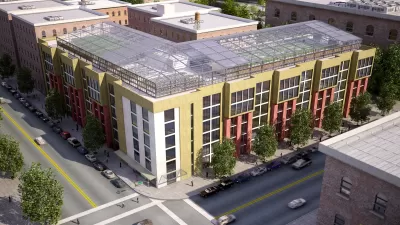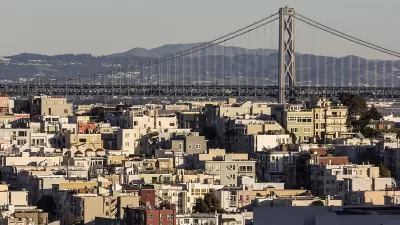Although the political optics are hard to see, Daniel Hertz argues that policies like inclusionary zoning need to be strengthened by orders of magnitude to have more than a token impact on housing affordability.

Few will argue with Daniel Hertz's basic premise: that major American cities face an affordability crisis with wide-ranging effects on economic mobility, race relations, homelessness, and our very conception of what urban life means. Hertz makes the case that current policies to encourage affordable development, while admirable, are embarrassingly under-powered.
In the face of massive deficits in the availability of affordable housing—for the middle as well as lower classes—"IZ needs to be reframed as not a centerpiece, but a minor part of an affordable housing agenda that actually serves everyone who needs help." That agenda might include measures like direct taxes on rising residential property values (to combat speculation) and funding Housing Choice Vouchers by dropping mortgage interest tax deductions for high-income homeowners.
Hertz concludes, "There is no way to argue that inclusionary zoning is coming close to meeting the demand for below-market housing—or, importantly, that it will ever be able to do so. A hundred and forty [affordable] units per year in San Francisco is not off by ten percent, or fifty percent, or even just one order of magnitude [...] The fact that IZ may be on the edge of what is politically possible today should not blind us to the fact that the cities and neighborhoods we envision require vastly more ambition."
FULL STORY: Inclusionary zoning has a scale problem

Planetizen Federal Action Tracker
A weekly monitor of how Trump’s orders and actions are impacting planners and planning in America.

Map: Where Senate Republicans Want to Sell Your Public Lands
For public land advocates, the Senate Republicans’ proposal to sell millions of acres of public land in the West is “the biggest fight of their careers.”

Restaurant Patios Were a Pandemic Win — Why Were They so Hard to Keep?
Social distancing requirements and changes in travel patterns prompted cities to pilot new uses for street and sidewalk space. Then it got complicated.

Platform Pilsner: Vancouver Transit Agency Releases... a Beer?
TransLink will receive a portion of every sale of the four-pack.

Toronto Weighs Cheaper Transit, Parking Hikes for Major Events
Special event rates would take effect during large festivals, sports games and concerts to ‘discourage driving, manage congestion and free up space for transit.”

Berlin to Consider Car-Free Zone Larger Than Manhattan
The area bound by the 22-mile Ringbahn would still allow 12 uses of a private automobile per year per person, and several other exemptions.
Urban Design for Planners 1: Software Tools
This six-course series explores essential urban design concepts using open source software and equips planners with the tools they need to participate fully in the urban design process.
Planning for Universal Design
Learn the tools for implementing Universal Design in planning regulations.
Heyer Gruel & Associates PA
JM Goldson LLC
Custer County Colorado
City of Camden Redevelopment Agency
City of Astoria
Transportation Research & Education Center (TREC) at Portland State University
Camden Redevelopment Agency
City of Claremont
Municipality of Princeton (NJ)




























